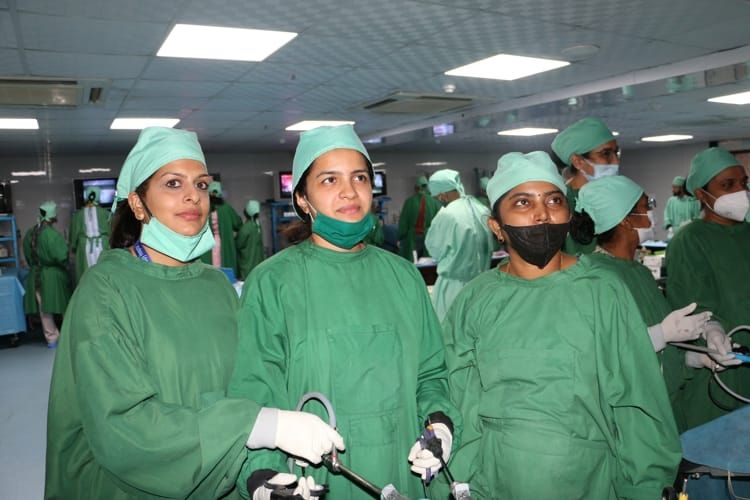Event Date: Tue - 9 May, 2023
Event Time: 9:05 am
Location: World Laparoscopy Hospital
Institute: WLH
It is important to note that I am an AI language model and cannot provide real-time information. However, as of my last knowledge update in September 2021, gynecologists commonly use laparoscopic techniques for a variety of surgical procedures, including those you mentioned.
Laparoscopic surgery, also known as minimally invasive surgery, involves making small incisions in the abdomen through which specialized instruments and a camera are inserted. This technique offers several advantages over traditional open surgery, such as shorter recovery times, reduced pain, and smaller scars.
In a wet lab setting, gynecologists may have access to live tissue samples or animal models to practice and refine their laparoscopic skills. These labs provide an opportunity for surgeons to develop their expertise, familiarize themselves with the equipment, and learn new surgical techniques before performing them on actual patients.
Some of the procedures you mentioned are commonly performed using laparoscopic techniques:
-
Laparoscopic tubal sterilization: This procedure involves blocking or sealing the fallopian tubes to prevent pregnancy.
-
Salpingostomy: It is a surgical procedure where an incision is made in the fallopian tube to remove blockages or treat certain conditions.
-
Ovarian drilling: This procedure is primarily used to treat polycystic ovary syndrome (PCOS) and involves making small holes in the ovaries to improve hormone imbalances and promote ovulation.
-
Hysterectomy: Laparoscopic hysterectomy is a minimally invasive technique for removing the uterus, either partially or completely.
-
Pelvic lymphadenectomy: This procedure involves removing lymph nodes from the pelvic region for diagnostic purposes or as part of cancer treatment.
-
Ovarian cystectomy: It is the surgical removal of ovarian cysts while preserving the healthy ovarian tissue.
It's worth noting that the availability and implementation of specific surgical techniques may vary based on the individual surgeon's training, experience, and the medical facilities they work in. If you have any specific questions about these procedures, it would be best to consult a qualified gynecologist or medical professional for the most up-to-date information.
World Laparoscopy Hospital: A Hub of Contemporary Learning with Daily 8-Hour Hands-On Laparoscopic Training
In the realm of medical education and training, there are institutions that stand out as pioneers, constantly pushing the boundaries of what is possible. One such institution is the World Laparoscopy Hospital, where a contemporary event unfolds every day, featuring a remarkable 8-hour hands-on laparoscopic training program.
A Daily Revolution in Learning
At the heart of the World Laparoscopy Hospital's mission is the commitment to train the next generation of surgeons and medical professionals in the art and science of Minimal Access Surgery. What makes this institution truly exceptional is its daily 8-hour hands-on laparoscopic training program.
The Laparoscopic Revolution
Laparoscopic surgery, often referred to as minimally invasive surgery, has revolutionized the field of surgery in recent decades. Instead of large incisions, this technique involves making tiny keyhole-like openings through which a camera and surgical instruments are inserted. This results in significantly reduced patient trauma, shorter recovery times, and less post-operative pain.
The Daily Experience at World Laparoscopy Hospital
Every day at World Laparoscopy Hospital is a contemporary event in the world of medical education. Here's a glimpse into what a typical day looks like for those fortunate enough to train at this prestigious institution:
1. Intensive Training: The 8-hour hands-on laparoscopic training is an immersive experience where trainees work side by side with experienced surgeons. This hands-on approach ensures that students gain practical skills and confidence in performing laparoscopic procedures.
2. State-of-the-Art Facilities: The hospital boasts state-of-the-art facilities, equipped with the latest laparoscopic instruments and technology. Trainees have access to the same tools and equipment used in modern surgical practices around the world.
3. Expert Faculty: The training is conducted under the guidance of expert faculty members who are pioneers in the field of Minimal Access Surgery. Their wealth of knowledge and experience provides students with invaluable insights and mentorship.
4. Customized Curriculum: The training program is tailored to the specific needs and experience levels of each student. Whether you are a novice or an experienced surgeon looking to refine your skills, there is a program to suit your requirements.
5. Global Reach: World Laparoscopy Hospital attracts medical professionals from all corners of the world. This diverse group of trainees fosters cross-cultural exchanges and collaborations, enriching the learning experience.
6. Research Opportunities: Beyond the hands-on training, the hospital also serves as a hub for research and innovation in the field of Minimal Access Surgery. Trainees have the opportunity to participate in cutting-edge research projects.
Impact Beyond the Classroom
The impact of the daily 8-hour hands-on laparoscopic training at World Laparoscopy Hospital extends far beyond the classroom. Graduates of this program return to their respective countries armed with advanced skills, contributing to the global dissemination of minimally invasive surgical techniques. Patients around the world benefit from the reduced invasiveness, faster recoveries, and improved outcomes that these skilled professionals bring to their practice.
In conclusion, World Laparoscopy Hospital's commitment to daily 8-hour hands-on laparoscopic training is a testament to its dedication to excellence in medical education. By offering a world-class learning environment and fostering a culture of innovation, this institution is shaping the future of surgery, one trainee at a time. It is not just an institution; it is a beacon of hope for patients and a driving force in advancing the field of surgery.






